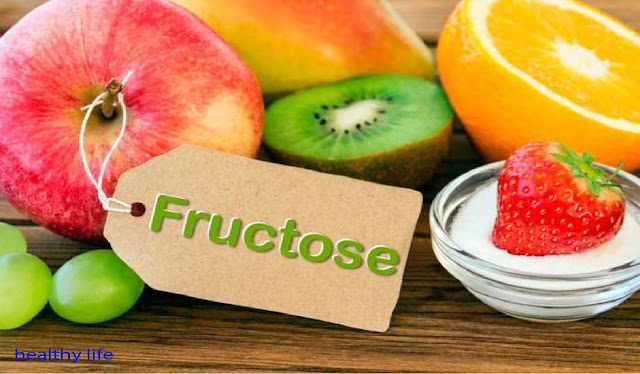 |
| Fructose |
WHAT IS Fructose
Fructose (along with glucose) is the most common type of simple carbohydrate in nature. Fructose is present in large quantities in almost all berries, fruits, and fruit plants. Especially a lot of this “fruit sugar” in apples, bananas and peaches. Almost 80% of honey consists precisely of fructose, while in ordinary table refinery it is up to 50%.
Since when using fructose, the level of insulin in the blood rises much less than when using glucose, it is traditionally allowed in the diet for diabetics. Based on this fact, fructose is often considered “dietary” and more beneficial than regular sugar. However, this opinion is deeply erroneous, and in reality pure fructose should be avoided.
Differences between fructose and glucose
Glucose is the main and most universal source of energy in the human body. The brain and many other organs “work” on pure glucose, and the muscles on glycogen (long-chain glucose molecules). As a result of digestion, most carbohydrates that enter the human body are broken down to glucose.
In order for glucose energy to be absorbed, the body produces the hormone insulin. In simple words, insulin plays the role of a “key” that opens up the possibility of storing calories in cells. Fructose, in turn, although it contains energy, does not affect the increase in insulin levels - this, in the end, significantly complicates the process of assimilation.
Fructose and Overweight
Since fructose practically does not increase insulin levels, the body literally cannot understand that it receives large volumes of readily available energy. As a result, the brain does not send saturation signals and the person simply does not stop eating, experiencing a deceptive feeling of hunger. The situation is complicated by the fact that fructose is two times sweeter than glucose, and, therefore, "tastier."
The regular use of large doses of fructose leads to a complex metabolic disorder. Firstly, fat deposition begins in atypical places (for example, in the liver). Secondly, the body develops insulin resistance (the first step on the road to diabetes). In addition, a habit of sweet taste is forming, which gradually develops into dependence.
“But our grandmothers ...”
The traditional argument, “Our grandmothers have eaten honey and fruit for centuries, is fructose harmful?” Completely ignores the fact that HFCS syrup (high-fructose corn syrup, or high fructose corn syrup) is used everywhere. It is this syrup, and not ordinary sugar at all, that is used in the manufacture of many carbonated drinks, desserts and pastries.
The reasons that push food manufacturers to use fructose syrup are commonplace - such a syrup mixes more easily with other ingredients, has a sweeter taste, lasts longer and costs less than sugar. In addition, shoppers eat a lot more fructose syrup products for the aforementioned reason for disabling saturation in the brain.
Fructose Syrup Products
Fructose syrup can be found not only in sweet carbonated drinks, but also in packaged juices, yoghurts, mayonnaise, ketchup, chocolate bars, sweets and bars (including “healthy” muesli bars). It is important to understand that the thoroughly whipped fructose syrup is responsible for the airy texture of most cakes, marshmallows, cookies, and ice cream.
Moreover, on the labels as part of the product, this syrup is most often hidden behind many different names - from the honest “corn syrup” to the acronym HFC or even “natural honey” and “agave syrup”, which also consist of 80% fructose. Only a few countries require manufacturers to explicitly indicate the presence of HFCS syrup in the composition.
Corn Syrup: Health Harm
Modern nutritionists are unanimous in the view that the Western world’s obesity epidemic is closely linked to increased use of fructose corn syrup in the food industry. It is the presence of this syrup in the drinks that explains the fact that you can drink a liter of Coca-Cola and not at all feel the calories obtained by the body.
The harm to fructose like this for health consists in a complex metabolic disorder - from blocking saturation mechanisms leading to regular overeating and obesity, ending with impaired brain function and an increased tendency to depression. Recall that sweet is one of the main sources of pleasure for the body.
Is fructose from fruits harmful?
Returning to the topic of the harm of natural fructose in fresh fruits, it is necessary to understand that together with such fructose the body receives other simple carbohydrates (for example, glucose), fiber, and a number of macro- and microelements. As a result, the mechanism of action of this fructose on metabolism is fundamentally different from the effect of pure fructose in powder.
Over the millennia of the existence of mankind, the body has adapted to receive an adequate amount of fructose from food. If you eat two apples daily, naturally nothing bad will happen to you. However, a glass of juice squeezed from five apples and drunk in a few seconds is a completely different story. Not to mention hydrolyzed fructose corn syrup.
***
Fructose, mistakenly considered a “safe” substitute for table sugar, is an extremely harmful substance for proper metabolism. Despite the fact that the human body can cope with fructose from fresh fruits, most fast foods contain fructose corn syrup, which leads to the development of obesity and other health problems.

Post a Comment